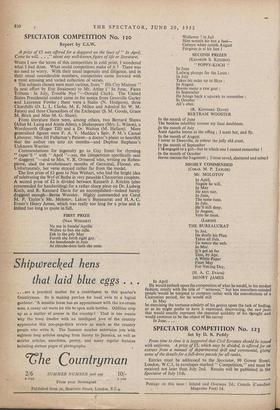A prize of £5 was o f fered for a doggerel on
the lines of " In April, Come he will. . . ." about any well-known figure of life or literature: WHEN I saw the terms of this competition in cold print, I wondered what I had done. What could competitors make of it ? There was no need to worry. With their usual ingenuity and diligence, and in their usual considerable numbers, competitors came forward with a most amusing and varied collection of verses.
The subjects chosen were most various, from " His Coy Mistress " (a neat effort by Eric Swainson) to Mr. Attlee (" In June, Faces Tribune : In July, Trouble Nye "-Oswald Clark). The United States Presidential contest came in for notice from Granville Garley and Laurence Fowler ; there were a Stalin (N. Hodgson), three Churchills (D. L. L. Clarke, M. E. Millen and Admiral Sir W. M. James) and three Chancellors of the Exchequer (S. M. Goode, Grace M. Birch and Miss M. G. Shaw).
From literature there were, among others, two Bernard Shaws (Allan M. Laing and Annie Allen), a Shakespeare (Mrs. L. Wilson), a Wordsworth (Roger Till) and a Dr. Walton (M. Hallam). More generalised figures were F. A. V. Madden's Spiv, P. M.'s Casual Labourer, Miss Jill Fullarton's Patient—a doctor's plaint so heartfelt that the authOr ran into six months—and Daphne Stephens's Unknown Warrior.
Commendations for ingenuity go to Guy Innes for rhyming " caper'll " with " April "—yes, the competition specifically said " doggerel "—and to Mrs. V. R. Ormerod who, writing on Robes- pierre, used the revolutionary months of Germinal, Floreal, etc. Unfortunately, her verse strayed rather far from the model.
The first prize of £3 goes to Nan Wishart, who had the bright idea of celebrating the Wyf of Bathe in very passable Chaucerian couplets. A second prize of £2 is divided between Kenneth J. Kitchin (also commended for handwriting) for a rather sharp piece on Dr. Ludwig Koch, and R. Kennard Davis for an accomplished—indeed barely doggerel enough—Ftertie Wooster. Highly commended are Coral M. P. Taylor's Mr. Molotov, Lakon's Bureaucrat and H. A. C. Evans's Henry James, which was really too long for a prize and is indeed too long to quote in full.
FIRST PRIZE
(NAN WISHART)
Na mo in fresshe-Aprille Widwe to ben she nille. Eek in the joly May Fareth she forth right gay. An housbonde in Juin
At chirche-dore hath she sone. Weilawey ! in Juil Him scmeth hir but a fool- Certeyn whan comth August Forgoon is al hir lust 1
SECOND PRIZES
(KENNETH S. KLTCHIN)
" POPPY-KOCH " In June Ludwig plumps for the Loon : In July Takes his mike up to Skye : In August Braves many a raw gust : In September He brings back a squawk to remember : In October All's ober.
(R. KENNARD DAVIS) BERTRAM WOOSTER In the month of June
The bookies infallibly trouser my final doubloon.
In the month of July
Aunt Agatha looms in the offing ; I scent her, and fly.
In the month of August I totter to Deauville, to colour the jolly old crust.
Inthe month of September
1'4 engaged to a girl—but to which one I cannot remember 1 In the month of October Jeeves rescues the fragments ; I issue saved, shattered and sober!
HIGHLY COMMENDED (CORAL M. P. TAYLOR)
Mr. MOLOTOV In April, Negate he will.
In May He says nay. In June, The same tune.
In July, He'll still deny. In August, Veto he must.
(LAKON) THE BUREAUCRAT In Jan.
He drafts his Plan.
Takes all Feb.
To weave the web.
In Mar.
It's got so far That, by Apr. A White Paper Fixes May For Vesting Day.
(H. A. C. EVANS) HENRY JAMES In April
He would embark upon the composition of what he would, in his modest fashion, minify with the title of " sentence," but less marathon-minded people would be tempted to compare rather with the convolutions of a Ciceronian period, for he would still
In May
be exercising the tortuous subtlety of his genius upon the task of finding, or as he might prefer to have it expressed, discovering, the mot Juste that would exactly represent the essential quiddity of his thought and would continue to be the object of his survey In June...


















































 Previous page
Previous page